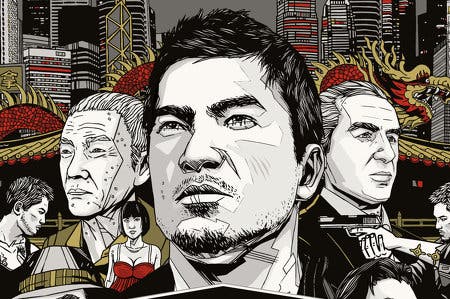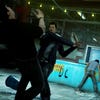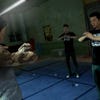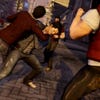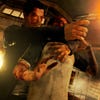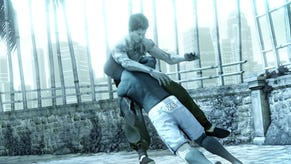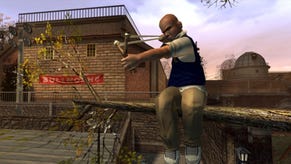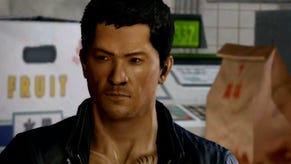Sleeping Dogs Review
Woof justice.
Wei Shen, a Chinese-American cop working undercover to infiltrate a notorious Hong Kong Triad gang, has just received a panicked message from Jackie, his childhood friend. They came up together on the mean streets of Hong Kong and it was Jackie - skinny, endearingly inept in criminal matters and blissfully unaware that his old friend is now a cop - who opened the door that allowed Shen inside the Triads.
But something has gone wrong. Trying to set up a big score for himself with his customary clumsiness, Jackie has tried to sell a shipment of stolen watches and been ripped off. He calls in Shen. "What are you going to do?" asks Jackie. Shen sits astride a motorbike, ready for action. "What I always do" he replies, and roars off to exact revenge-by-proxy on the thugs who took advantage of his friend's weakness.
As played out in one of Sleeping Dogs' many cut-scenes, this exchange is clearly intended as a rousing hero moment for Shen. But "what I always do" is also an unfortunate commentary on the rote structure that constantly holds Sleeping Dogs back. Originally developed as a new entry in Activision's middling True Crime series, before being abandoned and subsequently resurrected by Square Enix, this is as predictable an entry in the open-world cops-and-gangsters genre as it's possible to get.
So you roam a painstakingly designed virtual city, from the slums to the skyscrapers, guided by a GPS breadcrumb trail from one mission-giving contact to another. You drag hapless citizens from their vehicles and steal their rides, listening to a selection of contemporary and retro music tracks on the radio as you roar away. You take part in point-to-point street races. You unlock a series of safe houses, each more pimped out than the last. You deliver item A to location B. You escort character X. You steal cars to order, beat up people with target markers floating over their heads like little swords of Damocles, and trail cars without filling the gauge that makes them suspicious.
That's not to say that Sleeping Dogs gets anything badly wrong, but it's a paint-by-numbers version of an experience we've had dozens of times before. It's confidently put together; mission checkpoints are well placed, for example, and completed missions can be replayed to earn more XP, unlocking skills in two different tiers. One rewards considerate cop-style actions, such as minimising civilian damage, with upgrades to your firearms and driving abilities. The other path takes the Triad route, improving your fighting skills and melee weapon use depending on how brutal you are in combat.
These run alongside each other so you're never forced to choose between the benefits of being a good-guy cop or a hard-ass gangster. That's good from a gameplay point of view, but weakens the already fragile grasp the narrative has on Shen's conflicted loyalties. This is the sort of tale that demands a choice, yet Sleeping Dogs allows you to have your cake and punch it. Shen can be dutifully working to save lives one moment and ramming people face-first into table saws, hot stoves and even swordfish spears the next. The see-saw of morality in this sort of game has always been tricky to balance, but despite a story that begs to make such questions a core part of the experience, Sleeping Dogs simply avoids the issue entirely.
This isn't a game where you'll be going on many crazy rampages, at any rate. There are few guns in Sleeping Dogs, and those that are available are quick to run out of ammo. In keeping with the Asian setting, your skills as a melee fighter are more valuable and it's here that the game can genuinely boast of improving on what came before.
The robust and intuitive fighting system only becomes more flexible and satisfying over time. Based around a simple block-and-counter method, it allows Shen to tackle gangs of 10 or more at a time, unleashing simple punch and kick combos along with grapple moves and environmental kills. It's hardly original - both Assassin's Creed and Batman: Arkham Asylum pioneered this style of combat - but it's a genuine pleasure to use, and it makes the frequent street scraps a highlight rather than a grind.
Life as a pedestrian has taken a few cues from Assassin's Creed as well, with a rudimentary free running mechanism that allows Shen to leap and scramble over obstacles with rhythmic taps of the sprint button. Driving, too, is enjoyably balanced, with the handling on the faster cars and bikes having an arcade feel that suits the gameplay. It's only the gunplay that lets things down, but its heavy stickiness is more aggravating than fatal. The cover system is workable enough at long range, and when it allows you to drop into slow motion while vaulting into action, it taps into the melodramatic John Woo energy that the rest of the game references but rarely recaptures.
These play styles are juggled over 27 Triad story missions and four multi-part police cases; outside of these, you'll find the expected plethora of distractions and perk-bestowing collectables. You can sing karaoke, play Mahjong poker and bet on cock fights, or hack security cameras to identify drug suppliers. Meanwhile, ambient stats are being gathered for everything from driving without damage to the number of enemy bones broken. These can be tracked against your friends in the game's Social Club, yet another idea cut-and-pasted from the GTA textbook.
While it's easy to be sucked into these activities, they don't really add up to much. You'll amass millions of dollars during the game, but apart from the buffs offered by food vendors, there's little of use to spend it on. You can buy certain costumes to offer minor benefits to damage or XP and buy new vehicles to unlock new races, but in an easy game where progression comes naturally and every traffic light offers at least one high performance car to steal, it all feels unnecessary.
The most obvious example is Sleeping Dogs' half-hearted attempt at a dating mini-game. You occasionally come across young women that Shen can sweet-talk and take on dates. Or, rather, one date. Most of these characters appear briefly then vanish completely, their number disappearing from your phone, having yielded a gameplay perk in exchange for a walk around a park or a rooftop race. Sometimes you'll get an outraged text or phone message after they discover you've been on a laughably chaste date with someone else, but as an attempt to bring relationship elements into Shen's story it's all very unconvincing.
Even most of the game's weaknesses are inherited, rather than the result of any attempt to expand the genre boundaries. The frame-rate judders when travelling at speed and the game world has all the curious glitches and quirks that we've come to expect from such complex environments. None of this is unique to Sleeping Dogs, nor does it really detract from what is, broadly speaking, a good-looking game. Hong Kong's neon sprawl is well captured, along with the anachronistic collision between the modern-day and ancient beliefs that are tangled up in the city's heart.
The game is also surprisingly easy, greasing your ascent from street hoodlum to trusted Triad leader with a laissez-faire approach to time limits and objectives. It's rare that you'll fail a mission, and when you do it's likely to be the result of some physics snarl-up, AI freak-out or rogue GPS trail beyond your control. Quick restarts and the game's generous nature mean that you're never inconvenienced too much.
As efficient as it is at hitting its genre targets, the relentless second-hand mimicry keeps Sleeping Dogs from finding its own groove. The only time the game feels like it might find a niche to call its own is during the police cases, when the need to plant bugs, triangulate phone signals and gather evidence offers a brief respite from the crime clichés elsewhere. It doesn't last long, though, and never builds enough momentum to change the course of the game. The lure of the established GTA template is simply too strong to be broken by a game this beholden to what came before.
It's a sad irony that the gameplay format that offers the most freedom for the player is the one most likely to trap developers in a loop of repetitive, copycat design. They have the ability to conjure up large, populated, realistic worlds and traverse them in any number of ways, and yet still we end up getting the same old cops-and-robbers story.
Sleeping Dogs certainly doesn't deserve to take all the blame for this situation, and Rockstar has some serious game-raising of its own to do with GTA5. But when a game is so clearly intent on being a follower of trends rather than setting them, it's hard to feel much passion for Sleeping Dogs' vanilla retread of established ideas. When compared to his open-world peers, Wei Shen's stoic promise to do "what I always do" ultimately feels more like an apology for low ambition than a rallying cry.
